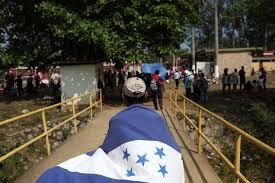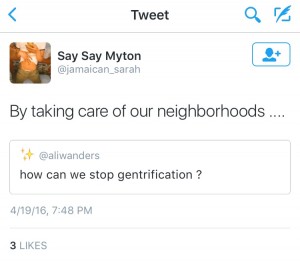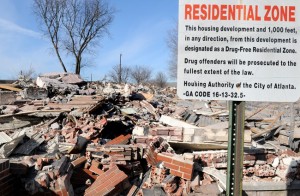American Dreamer
American Dreamer
Dreamer remains hopeful for naturalization against all odds.

The typical American high school senior is one that is well rounded. They participate extracurricular activities. They tailgate on Fridays. They are hardworking, active in their school and socially advanced. And when the time comes, they apply for higher education.
Emilio Villafana was one of those American high school seniors, until he found out he wasn’t.
“I thought I was an American until high school came around and my friends started getting jobs and licenses. I didn’t have a Social Security card or a birth certificate or anything that would allow me to get these things. That’s when I started to see a tangible difference between me and everyone else,” Villafana said.
Villafana was born in Trinidad and Tobago and moved to the United States when he was one years old. Student visas allowed his parents entry to the U.S. Their visas expired but they decided to stay in the U.S. to give Villafana and their family a better life.
“I’ve never known Trinidad. I left when I was a baby. I only know America, I have an American perspective on the world,” Villafana said.
He grew up like a regular American kid. He participated in sports and attended the American school system from kindergarten. When he could not obtain a driver’s license in high school he could not obtain a driver’s license after realizing he did not own a social security card. In his search to obtain one, it finally sinked in that he was in fact not a documented American citizen.
When the time came, he applied to Kennesaw State University, was accepted and began to make plans to attend against all odds. However, his citizenship status does not qualify him for any federal benefits, including financial aid and in-state tuition. He was forced to withdraw because he says it wasn’t the best choice financially.
“I always knew that my parents were constantly trying to gain citizenship because it was something my om talked about often, but I never really thought about how my status would affect me until I was faced with these new obstacles,” Villafana said.
According to the Pew Research Center, undocumented immigrants are parents to 7 percent of K-12 students. After a series of paperwork, interviews and being in the U.S. for over 10 years, Villafana mom was able to gain citizenship. This was a turning point for their family and Villafana knew he could now gain citizenship through naturalization. But the process would not be easy.
During Villafana quest for citizenship, the process proved to be tedious and costly. His dad lost his job and was out of work for over five years so his family was tight on money. He and his mom tried to do the paperwork herself but there were often mistakes that Homeland Security refused to look over.
“Not only was she propping up a family of three kids and a husband, she had to work to live. There wasn’t a lot of money available for filing fees. I still had plans to go to college though. And then she was diagnosed with stage four breast cancer,” Villafana said.
After the death of his mother, Villafana petition to gain citizenship was voided. Convinced there was still hope for his petition, a family member took him to a lawyer who said he would help Villafana enroll in Obama’s Deferred Action for Childhood Arrivals (DACA) program which gives unauthorized immigrants who came to the U.S. before age 16 a chance to stay in the U.S.
In 2013, He was able to apply for DACA but the process has taken longer than expected.
In order to be eligible for DACA, as well as show their continued residence through employment or education. applicants have to have a near-spotless criminal background,
Maintaining these requirements has been hard for Villafana. He is currently without a stable shelter and this has often interfered with his employment status. He has been couchsurfing for months and recently took the blow of having his DACA papers returned.
In September, Attorney General Jeff Sessions announced that the Trump administration will end protection from deportation for approximately 800,000 young Dreamers.
A recent decision was made to allow DACA renewals again and the deadline approached quickly. Villafana was able to beat the deadline by two days.
“The paperwork was sent back and I’ve been in limbo for the last few months,” Villafana said.
He is now raising money for his petition fees. If Villafana can manage to get his petition in time, he will have a chance at getting the most stable legal status he has had his entire life and can continue to build his way towards naturalization.
Atlanta Against Amazon
Atlanta Against Amazon
Atlantans have mixed feelings about the possibility of Amazon HQ

Last year amazon announced they’d be looking for a location for its new headquarters as the company has grown tremendously in the last few years. Atlanta appeared on a list amongst 19 other cities as a possibility of Amazon’s new “HQ2” location. This announcement promised 50,000 jobs and state officials are trying to lure the company.
Jasmine Adenuga moved to the Old Fourth Ward area of Atlanta one year ago. Adenuga may be new to Atlanta, but she isn’t new to Amazon. She has been an Amazon Prime member for four years and so the idea of HQ2 being down the street excites her.
“Amazon Prime has saved my life more times than I can count. You can’t beat 2-day shipping,” Adenuga said.
While some Atliens are excited about being nominated on the list for Amazon’s new HQ, others are not happy with teven the thought bad the move could mean for the city.
Colorful flyers that read “F*ck Amazon” are plastered all over town beckoning viewers to visit AtlantaAgainstAmazon.org. The site was launched to educate visitors on the negative impact “HQ2” could have on Atlanta.
The website provides a numbered list about the group’s beliefs. The consensus is that “HQ2” will ultimately result in further income inequality, unaffordable housing and traffic congestion that is not worth the said 50,000 jobs. They consider the move an invasion that will “turn employees into robots” and wreak havoc on the city.
Flyer posted on a pole on Georgia State Campus
“No, we don’t want Amazon here. In fact, we don’t want Amazon anywhere. We believe that Atlantans and all people of good conscience across the country should oppose the HQ2 proposal before the decision is made,” the website says.
Atlanta native Chris Thompson, 27, is not interested in what those against Amazon have to to say. Thompson grew up in Atlanta’s West End community and has seen it go through many changes like gentrification.
“All of a sudden these issues matter to white people but this stuff has been happening for years,” Thomson said.

One of the points made by #atlantaagainstamazon activists is that those who will work the blue collar jobs offered by the company will have to commute long hours into the city for minimum wage. Thompson says the activists against amazon already benefit from a history of displacement infrastructure in atlanta that was built on inequality.
“These have always been issues, but now since the gentry’s juice shops are at stake, they want to make a website and plaster lame stuff around the city,” Thompson said.
If people want your product, they’ll buy it.
When it comes to the likelihood that Amazon will chose Atlanta as their new HQ, Representative Roger Bruce doesn’t think the chances are high.
“People in Atlanta are talking about Amazon more than Amazon is talking bout Atlanta,” Bruce said.
Georgia Teen’s Aunt among Caravan Headed for United States
Georgia Teen’s Aunt among Caravan Headed for United States

The annual “Stations of the Cross” caravan was bigger than ever before and Honduran-American, Carmen de Leon has distant family making the trip.
De Leon’s aunt is one of the many Central American migrants traveling in a massive group, marching for their rights and protesting the immigration policies of President Donald Trump.
For de Leon’s relatives, the journey to Mexico began two weeks ago. She began talking to her aunt for the first time in months just a month before the caravan was scheduled to leave.
As a first generation American studying international affairs, De Leon’s says it is her job to provide guidance to her relatives about whether or not to go home – or go on.
Trump has been fixated on the caravan in the last week, suggesting that the migrants are dangerous and pose a threat to national security. Tweeting and retweeting about the migrants more than 10 times, Trump has brought a lot of attention to the matter.
“The Caravan is largely broken up thanks to the strong immigration laws of Mexico and their willingness to use them so as not to cause a giant scene at our Border. Because of the Trump Administration’s actions, Border crossings are at a still UNACCEPTABLE 46 year low. Stop drugs!” Trump tweeted Thursday.
De Leon says those traveling North are hopeful in the midst of discouraging tweets from president Trump as this is an annual occurrence for some Central Americans.
“Like most of what Trump says, I think it’s just ignorant to suggest that people like my tia’s sole purpose for traveling is to bring drugs to the U.S. Come on. That’s ignorant,” de Leon said.
De Leon says Trump should be banned from Twitter because tweets like that show the power of social media and how Trump is the prime example of spewing fake news.
“If he got off of Twitter and actually read, he’d know these people travel every year to get away from situations he couldn’t even imagine,” de Leon said.
De Leon says her parents hometown of Planeta is increasing with gang violence daily. Her family fears for the young.
“I just pray for their safety,” de Leon said.
The caravan has since stopped in Mexico City. According to Caravan organizer Irineo Mujica said what remains of the group will continue to seek meetings with representatives of the United Nations and Organization of American States.
As for de Leon, she will continue doing what she can to be supportive of this movement and keep up her studies at Georgia Gwinnett College.
“I’m no expert yet and I don’t have it all figured out but I do know that the best thing I can do is to keep studying and graduate next year. I’m studying so that I can be in a better position to help migrants from Central America and dispel things like that ” she said.
When Fourth Ward Grew Old: A discussion on gentrification focusing on one of Atlanta’s most famous historic neighborhoods.
When discussing gentrification, historically, it holds a negative connotation– wealthy white people move into an urban area, call it urban and low income residents are relocated and forgotten. This is the most common idea that reigns in conversations on the topic.
In a recent conversation with my mother, she asked where my boyfriend lives and I told her Old Fourth Ward. In shock, she responded to me “Fourth Ward?” and it hit me: Old Fourth Ward wasn’t always Old. The Fourth Ward my mother once lived in is not the same as the Old Fourth Ward that my boyfriend lives in today.
In that same moment I realized that it was a gentrified area. And here are the reasons why it is gentrified and ideas on how to actually be the “gentry” and include everyone in neighborhood revitalization.
Its (black) History
Atlanta neighborhood “Fourth Ward” was home of Dr. Martin Luther King and was once an elegant black neighborhood. Today, Old Fourth Ward is less than 50 percent black and pieces if it’s black history lie in its shadows.
The David T Howard building has been closed for over 20 years. Alumni have been trying to restore it, but they lack funds. This school was built with giving black kids a well rounded education in mind but the building remains, gated and vacant.
There is a new urban fantasy that now defines O4W and hides the neighborhood’s history.
Relocation of black residents
For most of the 20th century, Atlanta was known for its public housing. The very housing projects that were built to aid low income communities have since been demolished. Herndon homes off Northside drive, was demolished in 2010 and close to 250 families were relocated.
The demographics of Atlanta have changed drastically in the last five years. According to Creative Loafing, Atlanta was named one of the top 10 cities where gentrification is growing the fastest in 2015. The last census showed a 12% dip in the black population in Atlanta.
Recent Rapid Changes
Much of the change to the look of Old Fourth Ward was orchestrated by Gravel and The Atlanta BeltLine Redevelopment Plan. Adopted in 2005, the municipal revitalize the older in-town neighborhoods and make them attractive to people seeking a more urban setting.
In addition to the Beltline, Ponce City Market was a $180 million project that took six years to come to fruition.
The majority of these changes are not bad for the community, which suggests that gentrification isn’t all bad. In the end, change is inevitable and Old Fourth Ward is one of Atlanta’s most desirable neighborhoods.

However, when you have people criticizing the people who lived there previously for not being able to do things, such as art on the beltline or funding something like Ponce City Market, that require resources, kick them out and then call it an “urban Renaissance” it seems bad.
However, in the neighbirhood revitalization process, maybe we should look at the questions. What kinds of neighborhoods we want to create. How do we preserve and expand affordable housing? How do we improve neighborhood while including the existing residents?
Let’s figure out how to provides resources for the residents of these urban areas and integrate. Reinstate housing projects in the modern day.


